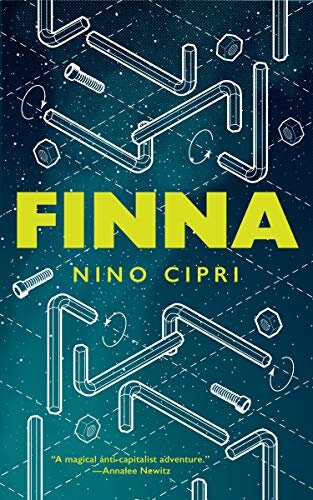If you’ve ever been in an IKEA, you’ll have a visceral recall of its maziness, the endless warren of showrooms in slow evolutions of living rooms, offices, dens, and kitchenettes that swerve and loop into each other; you’ve likely gotten lost, sped too confidently or panickedly through parallel bedroom dimensions, and gotten even more turned around. In their new novella FINNA, out this week from Tor.com, Nino Cipri takes this uncanny disorientation and turns it into a romp through the literal multiverse.
Ava and Jules are two low-wage retail workers at LitenVärld, our IKEA stand-in, on the trail of a customer’s missing grandmother, Ursula Nouri. But it turns out (as a cheesy corporate training video helpfully explains), Ursula has not just wandered into another showroom, but into another parallel reality. The showrooms’ maziness give rise to occasional maskhål, wormholes to other universes, with other, bizarro LitenVärlds. Ava and Jules—who, incidentally, have just broken up—track Ursula through an increasingly perilous series of alternate big-box retail stores using their LitenVärld-issue multiverse GPS, cozily nicknamed FINNA.
IKEA is a perfect specimen of modern consumer capitalism and its contradictions. Its brand is mass-produced individualism: furniture with enough design personality (and even cute names) to position itself as tasteful self-expression through home decor. Not too much personality, though, not so much that it can’t be endlessly, cheaply, and profitably iterated in identical stores across the globe. Its modular, disassembled packages have a smooth interchangeability, and even its instructions are stripped of individual language. The end result is both quirky and alarmingly faceless, personality with a clone-y aftertaste—and really, isn’t that every modern big brand that wants to be buds, every sassy corporate Twitter account, every wacky Super Bowl ad, every promotional email that fist-bumps your inbox with, “Hey Theodore: don’t miss these awesome new deals”?
Cipri does a fantastic job capturing that capitalist uncanny valley in LitenVärlds across multiple universes. There’s the soft nightmare of how interchangeable the company in our universe sees its workers and customers alike; but once we travel to other realities, those looking-glass LitenVärlds are like an ugly unmasking. There’s a LitenVärld with chairs that snap up unwary browsers (in carnivorous capitalism, the consumer becomes the consumed) and a hive-mind LitenVärld (in drone capitalism, everyone is customer and worker at once, as interchangeable as wooden pegs and hex wrenches, in an optimized soup of mass-produced sameness). But the maskhål likewise lead to better worlds of courage, curiosity, and adventure, worlds that break out of the soullessness of consumer retail.
And this gets at the importance of Jules as a charismatic nonbinary hero: someone prepared to resist sameness ferociously, who refuses to be satisfied with the world as it is and wants to see another, better way of being. In Ursula K. Le Guin’s 2014 National Book Awards speech, she held up this mode of dissatisfaction and imagination as the work of literature:
We live in capitalism. Its power seems inescapable. So did the divine right of kings. Any human power can be resisted and changed by human beings. Resistance and change often begin in art, and very often in our art - the art of words.
That’s especially true of speculative fiction, which in reaching for the outlandish and sideways, both tears the mask of familiarity from capitalist grotesqueries and imagines lives without them. Cipri is a terrific voice for this work, and their FINNA an enjoyable and smart entry in this project.













In this final novel of The Daevabad Trilogy, Ali, Nahri, and Dara are morally challenged beyond endurance by the rise of death magic in their beloved kingdom. How they respond changes everything.